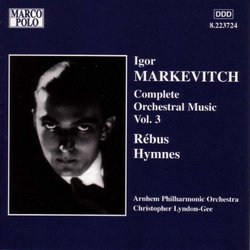| All Artists: Igor Markevitch, Rebus Hymnes Title: MARKEVITCH: Orchestral Music, Vol. 3 - Rebus / Hymnes Members Wishing: 0 Total Copies: 0 Label: Marco Polo Release Date: 10/5/2000 Genre: Classical Style: Symphonies Number of Discs: 1 SwapaCD Credits: 1 UPC: 730099372428 |
Search - Igor Markevitch, Rebus Hymnes :: MARKEVITCH: Orchestral Music, Vol. 3 - Rebus / Hymnes
 | Igor Markevitch, Rebus Hymnes MARKEVITCH: Orchestral Music, Vol. 3 - Rebus / Hymnes Genre: Classical
|
Larger Image |
CD DetailsSimilar CDs
|
CD ReviewsAbsolutely exhilarating G.D. | Norway | 10/16/2009 (5 out of 5 stars) "Igor Markevitch's fame still rests more or less exclusively on his work as one of the most remarkable conductors in the twentieth century. But the Marco Polo series of his orchestral music, should - if there is any justice - fill out that picture significantly. Indeed, I don't think I am exaggerating that this series reveals him as one of the most remarkable composers of the twentieth century as well. To emphasize: Markevitch is not merely a conductor who also composed (as most conductor-composers do; in a derivative, though often well-crafted and imaginative, manner); Markevitch's music is highly original, spectacularly enjoyable, always fresh and bold. In fact, Markevitch is perhaps the most convincing representative of Russian futurism (Prokofiev's forays into the genre perhaps excepted) I've heard. Even so, I readily admit that the stylistic range is rather limited, and I can, in a sense, see why he gave up composing so early instead of continuing to write the same pieces over and over. Still, we should be truly grateful for having this remarkable body of music, and also be grateful to the Arnhem Philharmonic, Christopher Lyndon-Gee and Marco Polo for making it available in usually more than acceptable, though a little rough, performances.
Rébus is one of the most exhilarating works I know. It is an absolutely brilliantly scored reflection on Death in six movements, but this frenzied, mostly ostinato-based work is never dour or boring, skittering and bouncing around as a mechanical, malfunctioning, barbarian golem. The prelude already establishes the jerky, shuddering nature of the work, leading to a frantically energetic, motoric and inhuman Danse with braying brass and angular string figures. The Gigue is alienating and mechanistic, leading into a chillingly desperate set of Variations, but the work truly gains momentum in the masterly, anxious ostinato Fugue, to culminate in the cataclysmic panic of the thumping Parade. This utterly mesmerizing work indeed builds on rebus-like interactions between themes and rhythmic figures the `meaning' of which isn't clear until later in the work. Atmospherically, it reminds one of those futuristic nightmare visions of urban alienation in some of the paintings from the same era. Hymnes is almost as exciting, and more subtle and compositionally resourceful; in the Prelude the surface is steady and calm, but there is an undercurrent of panic that is gradually breaking through. The Hymn of Work is a viscerally exciting futuristic, boisterous display of mechanistic and electrical, machine-like intensity, and the other Hymns are mostly energetic with a clearly present sense of paranoia ending in a hovering, coldly floating and shifting, and utterly, magically marvelous Hymen à la Mort. The whole work is masterly display of complex rhythm and ingenious counterpoints, woven together into something that is, if not unquestionably, then at least close to, a masterpiece. As with the earlier installments in the series, it is perhaps possible to imagine slightly more polished performances of the music here, but the performances are still far, far more than merely serviceable. They do, unfortunately, leap rough-shod over some details and miss others, but they do realize the power and bitingly mechanistic élan of the music and the forward momentum. Sound quality is good enough not to detract from the enjoyment of the disc. In short, a marvelous release (with a few shortcomings), urgently recommended." |

 Track Listings (11) - Disc #1
Track Listings (11) - Disc #1


